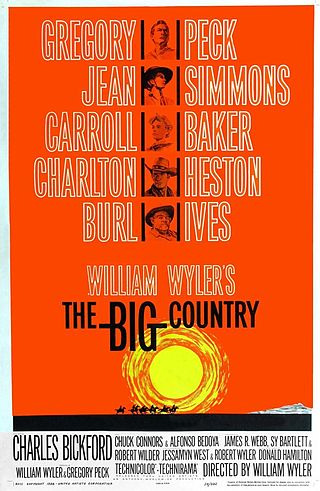
The Big Country is a 1958 American epic Western film directed by William Wyler, starring Gregory Peck, Jean Simmons, Carroll Baker, Charlton Heston, and Burl Ives. The supporting cast features Charles Bickford and Chuck Connors. Filmed in Technicolor and Technirama, the picture was based on the serialized magazine novel Ambush at Blanco Canyon by Donald Hamilton and was co-produced by Wyler and Peck. The opening title sequence was created by Saul Bass.
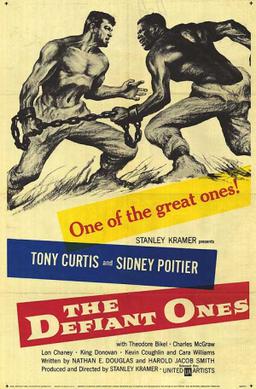
The Defiant Ones is a 1958 American drama film which tells the story of two escaped prisoners, one white and one black, who are shackled together and who must co-operate in order to survive. It stars Tony Curtis and Sidney Poitier.

East of Eden is a 1955 American period drama film directed by Elia Kazan and written by Paul Osborn, adapted from the fourth and final part of John Steinbeck's epic 1952 novel of the same name.

One-Eyed Jacks is a 1961 American Western film directed by and starring Marlon Brando, his only directorial credit. Brando portrays the lead character Rio, and Karl Malden plays his partner, "Dad" Longworth. The supporting cast features Pina Pellicer, Katy Jurado, Ben Johnson and Slim Pickens. In 2018, the film was selected for preservation in the United States National Film Registry by the Library of Congress.

Accident is a 1967 British drama film directed by Joseph Losey. Written by Harold Pinter, it is an adaptation of the 1965 novel Accident by Nicholas Mosley. It is the third of four Losey–Pinter collaborations; the others being The Servant (1963), Modesty Blaise (1966) and The Go-Between (1971). At the 1967 Cannes Film Festival, Accident won the Grand Prix Spécial du Jury award. It also won the Grand Prix of the Belgian Film Critics Association.

John Saxon was an American actor who worked on more than 200 film and television projects during a span of 60 years. He was known for his work in Westerns and horror films, often playing police officers and detectives.

Pernell Elven Roberts Jr. was an American stage, film, and television actor, activist, and singer. In addition to guest-starring in over 60 television series, he was best known for his roles as Ben Cartwright's eldest son Adam Cartwright on the Western television series Bonanza (1959–1965), and as chief surgeon Dr. John McIntyre, the title character on Trapper John, M.D. (1979–1986).
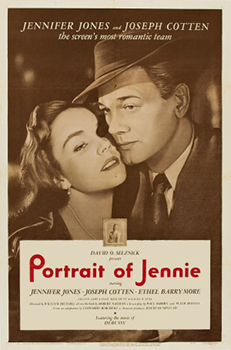
Portrait of Jennie is a 1948 American supernatural film based on the 1940 novella by Robert Nathan. The film was directed by William Dieterle and produced by David O. Selznick. It stars Jennifer Jones and Joseph Cotten. At the 21st Academy Awards, it won an Oscar for Best Special Effects. Joseph H. August was also nominated for an Academy Award for Best Cinematography - Black and White.

"The Bachelor Party" is a 1953 television play by Paddy Chayefsky which was adapted by Chayefsky for a 1957 film. The play premiered to critical acclaim.
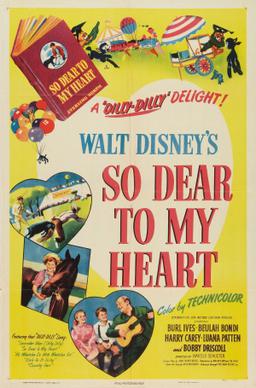
So Dear to My Heart is a 1948 American live-action/animated comedy-drama film produced by Walt Disney and released by RKO Radio Pictures. Its world premiere was in Chicago, Illinois, on November 29, 1948. Like 1946's Song of the South, the film combines animation and live action. It is based on the 1943 Sterling North book Midnight and Jeremiah. The book was revised by North to parallel the film's storyline amendments and then re-issued under the same title as the film.
Desire Under the Elms is a 1924 play written by Eugene O'Neill. Like Mourning Becomes Electra, Desire Under the Elms signifies an attempt by O'Neill to adapt plot elements and themes of Greek tragedy to a rural New England setting. It was inspired by the myth of Phaedra, Hippolytus, and Theseus. A film version was produced in 1958, and there is an operatic setting by Edward Thomas.

Cat on a Hot Tin Roof is a 1958 American drama film directed by Richard Brooks, who co-wrote the screenplay with James Poe, based on the 1955 Pulitzer Prize-winning play of the same name by Tennessee Williams. The film stars Elizabeth Taylor, Paul Newman, Burl Ives, Jack Carson, and Judith Anderson.

The Knack …and How to Get It is a 1965 British comedy film directed by Richard Lester and starring Rita Tushingham, Ray Brooks, Michael Crawford, and Donal Donnelly. The screenplay by Charles Wood is based on a play of the same name by Ann Jellicoe. The film is considered emblematic of the Swinging London cultural phenomenon. It was the first movie appearance of Jane Birkin and Charlotte Rampling.

Cry, the Beloved Country is a 1951 British drama film directed by Zoltán Korda and starring Sidney Poitier, Charles Carson and Canada Lee, in his last film role. The film is based on the novel of the same name written by Alan Paton.

Sons and Lovers is a 1960 British period drama film directed by Jack Cardiff and adapted by Gavin Lambert and T. E. B. Clarke from the semi-autobiographical 1913 novel of the same name by D. H. Lawrence. It stars Trevor Howard, Dean Stockwell, Wendy Hiller, Mary Ure, and Heather Sears.

He Who Must Die is a 1957 French-Italian film directed by Jules Dassin. It is based on the novel Christ Recrucified by Nikos Kazantzakis. It was entered into the 1957 Cannes Film Festival.
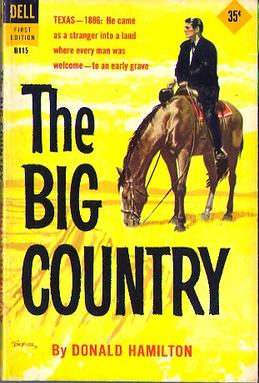
The Big Country is a Western novel by Donald Hamilton. It was originally serialized in The Saturday Evening Post as Ambush at Blanco Canyon. Published two years prior to Hamilton's Death of a Citizen, which launched his popular Matt Helm series, it explores many of the same themes of self-reliance that dominated the author's work.

Middle of the Night is a 1959 American drama film directed by Delbert Mann, and released by Columbia Pictures. It was entered into the 1959 Cannes Film Festival. It stars Fredric March and Kim Novak. The screenplay was adapted by Paddy Chayefsky from his Broadway play of the same name.
Daniel L. Fapp, A.S.C. was an American cinematographer, best known as the director of photography for West Side Story (1961), for which he won an Academy Award for Best Cinematography, and The Great Escape (1963). He also was nominated for Academy Awards for his cinematography for Desire Under the Elms (1958), The Five Pennies (1959), One, Two, Three (1961), The Unsinkable Molly Brown (1964), Ice Station Zebra (1968) and Marooned (1969).
Samuel Donald Hartman was an American screenwriter and director and former production head of Paramount Pictures. He and Stephen Morehouse Avery were nominated for the Academy Award for Best Story for The Gay Deception (1935). He was also nominated with Frank Butler for the Academy Award for Best Original Screenplay for Road to Morocco in 1942.

















